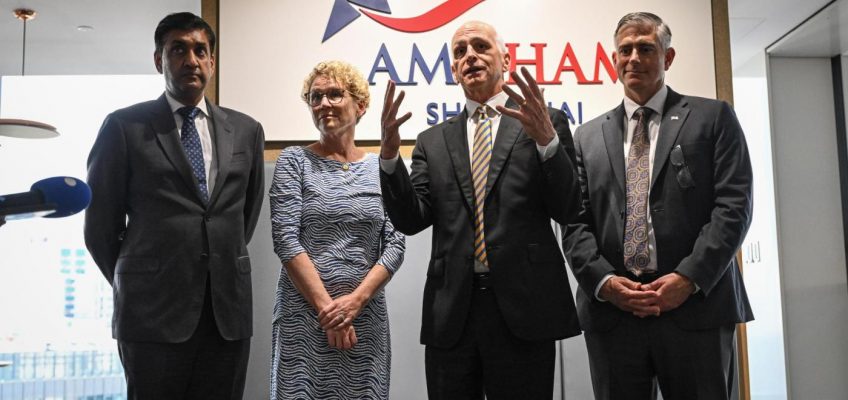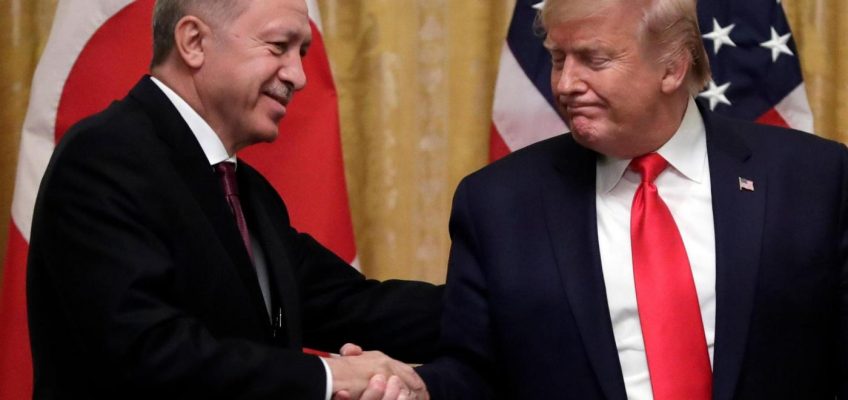By KEN MORITSUGU, Associated Press
SHANGHAI (AP) — The head of a U.S. congressional delegation visiting China said he backed renegotiating the rules governing the global economy to take into account China’s rise and that of others such as India and Brazil.
Rep. Adam Smith, a Democrat from Washington state, told the mayor of Shanghai on Thursday that the U.S.-led post-World War II order has worked well for many countries, including China, but that “we understand that things have changed.”
US Representative Adam Smith speaks during a press conference at the American Chamber of Commerce (AmCham) in Shanghai, China, Thursday, Sept.25, 2025. (Jade Gao/Pool Photo via AP)
His remarks, at end of a five-day trip to China, dovetailed with Chinese leader Xi Jinping’s recent announcement of an initiative to build a more equitable global governance system. They also reflected the reality that though the U.S. remains the most powerful country in the world, China is emerging as a potential challenger for global leadership.
The delegation of three Democrats — Smith, Rep. Ro Khanna from California and Rep. Chrissy Houlahan from Pennsylvania — and Republican Rep. Michael Baumgartner from Washington state, wrapped up their trip in Shanghai after three days of meetings with government leaders in Beijing.
The main purpose of the visit — the first by members of the U.S. House of Representatives since 2019 — was to open up lines of communication between the governments, Smith said. A U.S. Senate delegation visited in 2023.
Citing the expansion of McDonald’s outlets in China, Smith said his biggest takeaway from the trip was that a lot of business is going on between the two economies despite the ongoing trade and tariff war.
“We have a lot of work to do to resolve those issues,” he told a small group of journalists after a meeting with the American Chamber of Commerce in Shanghai. The trade conflict is creating difficulties for companies on both sides of the Pacific, he said.
The lawmakers were later seen at a Starbucks, another U.S.-headquartered company, in the lobby of the office building.
Related Articles
Trump hosts Turkey’s Erdogan at the White House as the US considers lifting a ban on F-35 sales
Trump says he was victim of ‘triple sabotage’ at UN and Secret Service is looking into the matter
Federal judge refuses to reinstate eight former inspectors general fired by Trump administration
Judge rules feds can’t require states to cooperate on immigration to get disaster money
Trump administration to hold back grants from NYC, Chicago, Fairfax schools over bathroom policies
The exchange with the Shanghai Mayor Gong Zheng started after Smith politely interrupted Gong about 10 minutes — including time for translation — into the mayor’s introduction to Shanghai as an economic and financial center.
How is the U.S.-China tariff war impacting Shanghai’s economy, Smith wanted to know, and how does the mayor think it should be resolved.
Gong said that Shanghai, a major shipping port, is among those most affected because of its high exposure to international trade.
“We’re very glad to see that we already have talks and negotiations,” Gong said, citing the four rounds of meetings since May in Geneva, Stockholm, London and, most recently, Madrid.
He stated the Chinese government position that there are no winners in trade wars, but China will fight back if there is a war while remaining open to negotiation.
Smith expressed hope that both tariffs and other barriers to imports would be reduced. He then called for a robust debate about how to renegotiate the rules governing the economy.
“China and the U.S. are the two most important players in how we resolve that,” he said. “How do we get to an international rules based order that is more agreeable to everyone?”
China maintains that the current international order favors the U.S. and other rich nations. The government says it doesn’t want to overturn that order but make it better serve the interests of all countries, particularly developing ones.
“The collective rise of emerging markets and developing countries necessitates boosting the representation of the Global South,” a Foreign Ministry document says, using a catch-all term for those nations.
The three Democrats in the delegation are members of the House Armed Services Committee, and Smith repeated his call from the outset of the trip for more communication between the U.S. and Chinese militaries.
“Two of the largest nuclear powers in the world need to be talking to each other, particularly considering the fact that we do have some disagreements,” he said.




